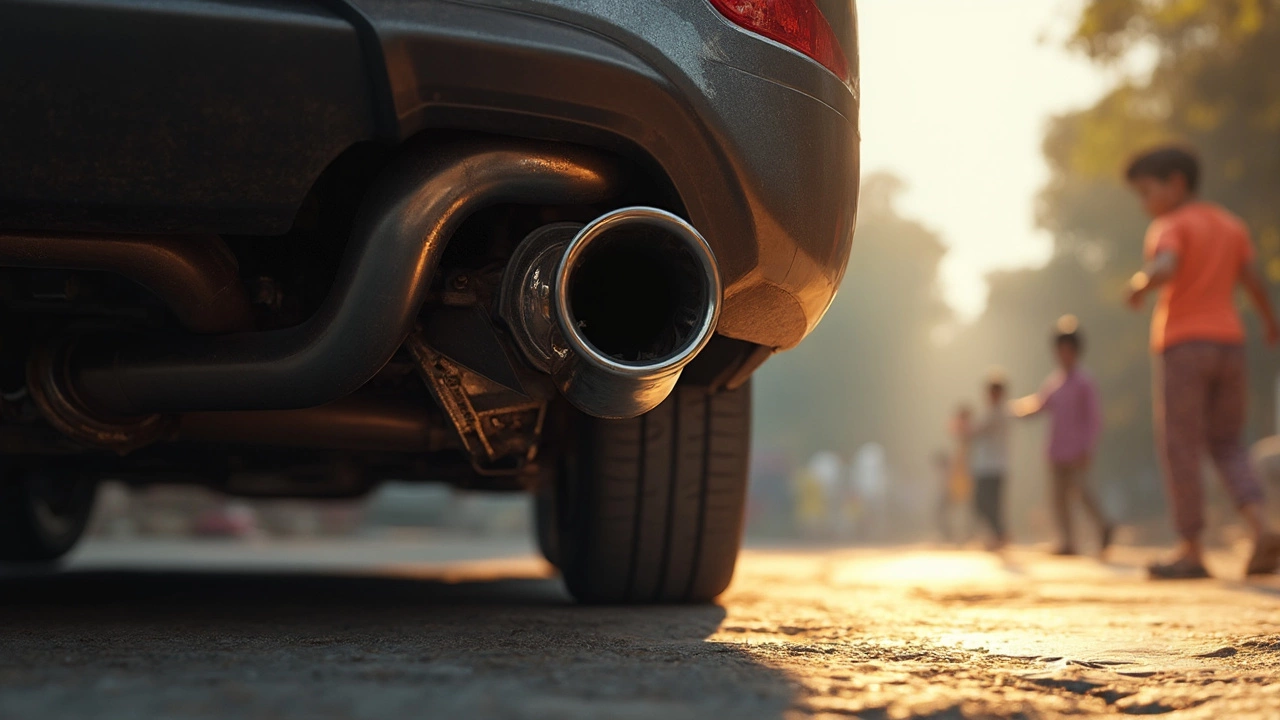New Exhaust System Costs: What Should You Expect?
 Mar, 24 2025
Mar, 24 2025
Thinking about replacing your car's exhaust system? You're probably wondering how much it's all going to set you back. Well, the cost can vary quite a bit—everything depends on a few key factors. But don’t worry, I’ll break it down for you.
First up, the type of vehicle you have plays a big role. Imagine an exhaust system as a tailor-made suit; it’s going to fit differently based on the car model and make. More complex systems for high-end cars can be pricier simply because they’re trickier to design and install.
Now, let's talk materials. Stainless steel exhausts, for instance, can cost a good chunk more than their aluminized steel counterparts, but they boast great durability against corrosion. Investing in the right material can save you money down the road. So, weighing durability versus immediate cost is key here.
Keep in mind, there are two installation routes: going DIY or calling in the pros. If you're handy with tools and love a weekend project, DIY could be a great way to cut costs. However, a professional might catch potential issues you could miss—a bit like going to the dentist instead of pulling your own tooth. We'll explore what fits your situation best.
- Understanding Exhaust System Costs
- Factors Influencing Price
- Choosing the Right Material
- DIY vs. Professional Installation
- Tips to Save Money
Understanding Exhaust System Costs
When it comes to figuring out how much a new exhaust system will cost, it's not as simple as naming a one-size-fits-all price. The total expense can swing widely based on several factors. Let’s dive into some of the key elements that play a role in the pricing.
Type of Vehicle
One of the biggest influences is the kind of vehicle you drive. A basic sedan might have an exhaust system that costs less, possibly ranging from £300 to £500 overall, while high-performance cars or trucks can see prices climbing beyond £1,000. It’s because high-end or large vehicles often have more complex systems that require specialized parts.
Materials Matter
The material of the exhaust system really affects the durability and price. If you go for an aluminized steel system, it's usually cheaper, but not as long-lasting. On the other hand, a stainless steel system is more expensive upfront but can prove to be cost-efficient in the long run because of its resistance to rust and corrosion.
Adding Up the Labour Costs
Don't forget about installation costs! If you’re having a shop do it, the labor can sometimes double the price of the parts. Labour rates can vary widely, but you could be looking at another £100 to £400 on top of the parts, depending on where you live and the complexity of the job.
Comparing Options
Whether you buy at a dealership, an auto shop, or online, prices can differ. Dealerships usually have higher prices but offer manufacturer-certified parts. Buying online can save you money but make sure it's the exact model to avoid future headaches.
| Exhaust Type | Approximate Cost |
|---|---|
| Aluminized Steel | £200 - £600 |
| Stainless Steel | £400 - £1,200+ |
Reviewing these aspects can guide you to a more informed decision when picking a car exhaust replacement. Remember, investing a bit more in the beginning can save you stress and cash down the road.
Factors Influencing Price
So you're looking into the exhaust system cost, but it's not just about the sticker price. Several elements dance around to influence the actual amount you might end up spending. Let's dig into these!
Type of Vehicle
First up, the type of vehicle you're driving around is a major player. If you own a rare or luxury model, replacing its car exhaust is likely to pinch your pocket more than a standard sedan. The rarity and complexity of the car mean parts are harder to find and pricier to purchase.
Material Choices
The material you choose for the new system can send the cost north or help you save cash. Stainless steel exhausts are a popular choice for those looking for durability. On the other hand, aluminized steel is cheaper, but it's not as resistant to rust. So, weigh your options considering both upfront expense and long-term maintenance.
Location and Labor
Your geographical location also affects the price. Living in a posh urban area? Expect to pay more in labor charges than in a small town. Why? Because the cost of living and doing business is higher, and labor prices reflect that.
Regulatory Requirements
Let's not forget laws and regs. Some areas have stringent emissions laws requiring specific exhaust system types, affecting your total spend. Loud exhaust bans or required emission reduction systems can add extra costs.
OEM vs. Aftermarket Parts
Lastly, should you go for original equipment manufacturer (OEM) parts or aftermarket ones? OEM parts fit perfectly and are usually backed by a manufacturer's warranty but can cost more. Aftermarket options, however, often come cheaper and offer varied performance enhancements. The catch? Variability in quality.
Keep these factors in mind as you shop around, and you'll better understand the total cost of making your vehicle quieter, more efficient, or both. Ignorance isn’t bliss when cash is on the line!

Choosing the Right Material
So, what material should you choose for your new exhaust system? It really comes down to your budget and how long you plan to keep your car. But let’s break it down with some facts.
Stainless Steel Exhausts
First off, stainless steel is the gold standard if you're after durability. It can handle all sorts of weather and doesn't rust easily. If you plan to drive your car for many years or live in a place with harsh winters, this could be your best bet. Sure, it costs more upfront, but it’s kind of like buying a good winter coat. Pay more now, save hassle later.
Aluminized Steel Exhausts
Next up, we have aluminized steel. It's cheaper than stainless, which is great if you're on a tighter budget. It does offer decent resistance to rust, but it's not as tough against harsh conditions in the long haul. If you're planning to swap cars in a few years, this might be a sensible choice.
Performance vs. Cost
If performance cars or mods are your thing, then a performance exhaust system using high-grade stainless steel might interest you. But, brace yourself, these can cost quite a bit more. The payoff? An awesome car sound and possibly better performance. Think of it as an investment in your driving experience.
Making the Right Choice
So, weigh your options. Are you more about long-term savings or short-term costs? Remember that labor costs can add up too, so factor that into your decision. And hey, if you’re still unsure, ask around. Chat with a mechanic or someone who's tinkered with their exhaust before.
DIY vs. Professional Installation
Deciding whether to tackle the exhaust system replacement yourself or hire a pro can be a tough call. Let's dive into both options to help you see what might suit you best.
DIY: A Hands-On Approach
If you're handy with a wrench and have a basic understanding of car mechanics, doing it yourself can save you quite a bit of money. You won't have to pay for labor, which can get pricey. Plus, there's a real satisfaction in fixing up your own ride.
Before you get started, make sure you have the right tools: a jack, jack stands, wrenches, and the appropriate exhaust components. Also, check if your vehicle's exhaust system bolts are rusty—sometimes they just won’t budge without a fight.
But beware, exhaust systems can be tricky. If you're not 100% confident, a DIY job could lead to more costs if things go wrong. And some setups are just too complex for a home mechanic.
Professional Installation: Leave It to the Experts
Going for professional installation might cost more upfront, but it’s a sure-fire way to ensure your vehicle is in top-notch shape. Experts have the skills and experience to handle all kinds of exhaust system quirks, something that might take you hours (or days) to figure out.
What’s more, professionals often provide a warranty on their work, giving you peace of mind in case something goes wrong later on. Just make sure to shop around and get a few quotes to avoid overpaying.
Remember, a properly fitted exhaust system ensures your car operates efficiently and safely. Sometimes the professional touch is worth every penny.
In short, weigh the pros and cons based on your skills and budget. Whatever you choose, a good exhaust system means less noise, better fuel efficiency, and happier driving!

Tips to Save Money
Getting a new exhaust system doesn't have to blow your budget. Let's dive into some smart ways to keep your wallet happy and your car purring.
1. Compare Quotes
Just like booking a holiday, shopping around can save you a bundle. Get at least three quotes to see how costs vary for the same job. Ask for everything in writing to sidestep any hidden surprises later.
2. Timing is Key
Believe it or not, the timing of repairs can impact costs. Mechanics are busier during peak seasons, leading to higher prices. Off-peak times could snag you a deal.
3. Opt for Quality Parts
While it might be tempting to snag the cheapest parts, investing in good quality components will save you more in the long run. A reliable exhaust system might mean fewer garage trips and prolonged vehicle life.
4. Tackle the Job Yourself
If you're feeling adventurous, tackling the DIY installation could cut labor costs. Plenty of online guides and video tutorials can help you strike the right notes. Just make sure you've got the right tools and enough patience.
5. Regular Maintenance
Keeping your current exhaust in tip-top shape can stave off an expensive replacement. Regular checks for leaks or rust and occasional cleaning can extend its lifespan.
Here's a quick look at potential savings based on these tips:
| Strategy | Potential Savings |
|---|---|
| Comparing Quotes | Up to 20% |
| Choosing Off-Peak Timing | 5-10% |
| Quality Parts Investment | Long-term savings |
| DIY Install | Labour cost only |
Remember, a bit of research and elbow grease can really pay off. Keep these tips in mind to ensure your car exhaust replacement doesn’t leave you high and dry.